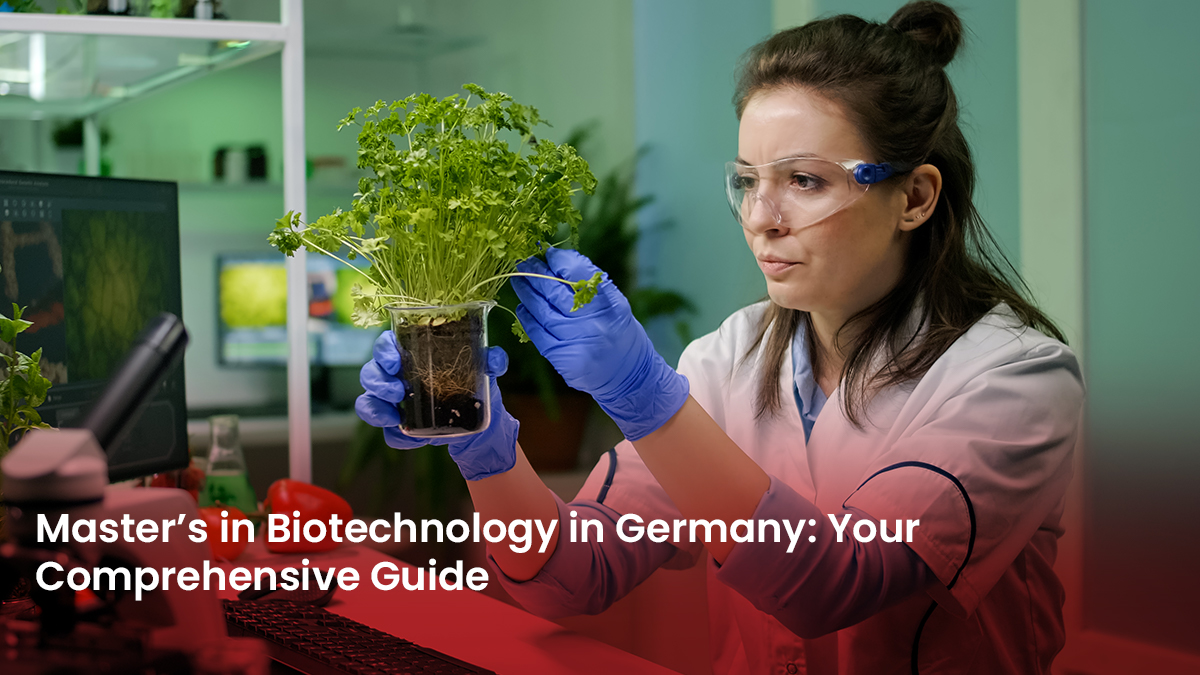Germany has established itself as a global leader in biotechnology, attracting students from all over the world to pursue their Master’s in Biotechnology. This advanced field combines biological science with technology to develop innovative solutions for health, agriculture, and environmental sustainability. With a strong emphasis on research and practical application, studying biotechnology in Germany offers students the opportunity to learn from world-class institutions, engage in cutting-edge research, and gain access to a thriving job market.
In this guide by MSM Unify, we will explore the various aspects of pursuing a Biotechnology Master’s in Germany, including top universities, program details, costs, and career prospects. Whether you’re an international student looking to enhance your skills or a local student aiming to specialize in this dynamic field, this guide will provide valuable insights to help you navigate your educational journey.
Biotechnology Masters programs in Germany
Biotechnology Master’s programs in Germany typically span two years and encompass a wide range of topics, including molecular biology, biochemistry, genetic engineering, and bioinformatics. These Biotechnology programs Germany 2025 are designed to provide students with both theoretical knowledge and practical skills through laboratory work and research projects.
Specialized areas of study
Students can opt for any specialization in various areas, such as:
-
Health Biotechnology
Focuses on drug development, clinical trials, and biopharmaceuticals
-
Environmental Biotechnology
Deals with waste treatment, bioenergy, and sustainable agricultural practices
-
Industrial Biotechnology
Includes the use of microorganisms and enzymes in the manufacturing processes
Curriculum highlights
The curriculum often includes core subjects like:
- Molecular Biology
- Bioprocess Engineering
- Genetic Engineering
- Bioinformatics
- Biostatistics
Practical training and internships are integral components, allowing students to gain hands-on experience and make industry connections
Master’s in Civil Engineering in Germany
Top universities for Biotechnology in Germany
Germany boasts a number of prestigious universities that offer Master’s programs in biotechnology. Here’s a listing of some of the top universities for Biotechnology in Germany:
|
University name |
Location | Program duration |
Tuition fees (approximately) |
| Ludwig Maximilian University | Munich | 2 years | €1,500/year approximately |
| Technical University of Munich | Munich | 2 years | €1,500/year approximately |
| University of Heidelberg | Heidelberg | 2 years | €1,500/year approximately |
| RWTH Aachen University | Aachen | 2 years | €1,500/year approximately |
| University of Freiburg | Freiburg | 2 years | €1,500/year approximately |
| University of Stuttgart | Stuttgart | 2 years | €1,500/year approximately |
| University of Mannheim | Mannheim | 2 years | €1,500/year approximately |
These universities are recognized for their robust academic frameworks, innovative research, and strong industry connections, making them ideal choices for students pursuing a Master’s in Biotechnology in Germany.
Admission requirements for Biotechnology Masters in Germany
To apply for a Master’s in Biotechnology in Germany, candidates typically need to meet the following requirements:
-
Bachelor’s degree
Pertinent undergraduate degree in biology, biotechnology, or any related field.
-
Language proficiency
Proof of English language proficiency (TOEFL/IELTS) or German language skills, depending on the program.
-
Transcripts
Academic transcripts and certificates from previous education.
-
Statement of Purpose
A personal statement outlining academic interests and career goals.
-
Letters of Recommendation
Generally, letters of recommendation from academic or professional references.
Master’s in Data Science in Germany
Tuition fees in Germany for Master’s in Biotechnology
Germany is famous for its reasonably priced education, especially for the international students. The average tuition fees for a Master’s in Biotechnology in Germany range from €1,000 to €3,000 per year, depending on the university. Here’s a breakdown of potential costs:
|
Expense |
Estimated cost (annual) |
| Tuition fees | €1,000-€3,000 approximately |
| Health insurance | €300-€400 approximately |
| Accommodation | €3,600-€7,200 approximately |
| Food and groceries | €2,000-€3,600 approximately |
| Transportation | €600-€800 approximately |
| Miscellaneous expenses | €1,000-€1,500 approximately |
Overall, students should budget approximately €10,000 to €20,000 per year for living expenses and tuition.
Scholarships for Masters in Biotechnology in Germany
Several scholarship opportunities are available for international students pursuing a masters in biotechnology in Germany. Some notable scholarships include:
-
DAAD Scholarships
For international students, it is provided by the German Academic Exchange Service
-
Erasmus+
A program that provides funding for students studying in Europe
-
University-Specific scholarships
Various universities offer their scholarships on the basis of merit or need
Master’s in Data Science in Germany
Application process for scholarships
To apply for scholarships, students generally need to submit:
- Academic transcripts
- A motivation letter
- Proof of language proficiency
- Any additional documents requested by the scholarship provider
Cost of living in Germany for students
Living costs in Germany vary per city. Here’s an overview of average living expenses in major cities:
|
City |
Monthly cost (approximately) |
| Berlin | €800-€1,200 approximately |
| Munich | €1,200-€1,800 approximately |
| Frankfurt | €1,000-€1,500 approximately |
| Hamburg | €900-€1,400 approximately |
| Stuttgart | €800-€1,200 approximately |
Students must budget for food, accommodation, transportation, and leisure activities.
Wondering About Living Expenses?
Calculate the cost of living in Germany and plan better!
Career prospects in Biotechnology in Germany
Graduates of Master’s in Biotechnology programs in Germany have excellent career prospects due to the country’s strong biotechnology industry. Potential career opportunities in biotechnology in Germany include:
- Biotechnologist
- Quality Control Analyst
- Research Scientist
- Regulatory Affairs Specialist
- Bioinformatics Technician
Average salary expectations
The starting average salary for most biotechnology graduates in Germany ranges from €40,000 to €55,000 annually, depending on specialization and experience.
Best cities to study Biotechnology in Germany
Several cities in Germany are renowned for their educational institutions and research facilities in biotechnology. Some of the best cities to study biotechnology in Germany include:
-
Berlin
A hub for innovation and home to many research institutions.
-
Munich
Famous for its finest education and really strong industry connections.
-
Heidelberg
Renowned for its research-oriented universities and a focus on health sciences.
-
Frankfurt
Offers a range of programs and is close to the financial district.
Master’s in Aerospace Engineering in Germany
International student experiences in Germany
International students in Germany often report a positive experience, highlighting the friendly culture, high educational standards, and opportunities for networking and professional growth. The multicultural environment allows students to connect with peers from diverse backgrounds.
Financial aid for Masters in Biotechnology in Germany
In addition to scholarships, there are various financial aid options available for international students. Many universities provide guidance on grants and loans specifically tailored for international students.
Conclusion
Pursuing a masters in biotechnology in Germany offers a unique opportunity to gain high-quality education in a vibrant and innovative environment. With affordable tuition fees, numerous scholarship options and excellent career prospects, it’s an attractive choice for students worldwide. Whether you’re interested in health sciences, environmental biotechnology, or industrial applications, Germany’s diverse programs can help you achieve your academic and professional goals.
With resources like MSM Unify to guide you through the process, you can confidently embark on your educational journey in this remarkable city. MSM Unify has helped 1,86,000+ students make their overseas education dream come true. We can help you explore over 50,000 programs across 1,500+ campuses in 21 destinations.
FAQs
1. What qualifications are required for a Master’s in Biotechnology in Germany?
Admission typically requires a relevant bachelor’s degree, proof of language proficiency, and letters of recommendation.
2. What is the cost of studying biotechnology in Germany?
Tuition fees range from €1,000 to €3,000 per year, while living expenses can average around €10,000 to €20,000 annually.
3. What scholarships are available for international students?
Scholarships such as DAAD and Erasmus+ are available, along with university-specific scholarships based on merit.
4. What career opportunities are there for biotechnology graduates in Germany?
Graduates can pursue roles like biotechnologist, quality control analyst, or research scientist, with starting salaries of around €40,000 to €55,000.
5. Which German cities are best for studying biotechnology?
Top cities include Berlin, Munich, Heidelberg, and Frankfurt, each offering excellent educational institutions and vibrant student life.
6. What is the standard of education for foreign students in Germany?
Germany is known for its high academic standards, innovative research, and a welcoming atmosphere for international students.
7. Can I work while studying in Germany?
International students are allowed to work part-time during their studies, with specific regulations depending on their visa status.
8. Does the Master’s program provide any internship opportunities?
Many universities offer internship programs as part of their curriculum, providing practical experience in the biotechnology field.
9. How long does it take to earn a master’s degree in biotechnology in Germany?
Most master’s programs in biotechnology typically last for two years, comprising coursework and research projects.
10. Is it necessary to learn German to study biotechnology in Germany?
While many programs are offered in English, learning German can enhance your experience and job prospects in the local job market.



























